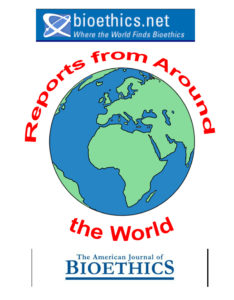 by Fernando Hellmann, Ph.D., Silvia Cardoso Bittencourt, Ph.D., Fabíola Stolf Brzozowski, Ph.D., Mirelle Finkler, Ph.D., Marta Verdi, Sandra Caponi, Ph.D.
by Fernando Hellmann, Ph.D., Silvia Cardoso Bittencourt, Ph.D., Fabíola Stolf Brzozowski, Ph.D., Mirelle Finkler, Ph.D., Marta Verdi, Sandra Caponi, Ph.D.
In times of crisis, like the current pandemic of COVID-19, the perception that ethical standards can be relaxed due to the urgent need for solutions is growing, according to Stoeklé and Hervé. For them, “Ethics is only useful if you have the time, and right now, time is exactly what we do not have.” It is a misperception without any doubts. Ethics has always preserved its identity as a rationalization of human action. Therefore, ethical reflections to take decisions are useful all the time and must be reinforced in times of pandemic.
Stoeklé and Hervé complain that the French Ministry of Health has requested the intervention of the National Consultative Ethics Committee (CCNE) in the face of the COVID-19 by claiming that “now is not the time for ethical reflections.” As a governmental advisory council on bioethics issues, CCNE may contribute to the controversial discussion within society regarding the government measures facing COVID-19. As pandemics have been recurrent since the emergence of bioethics: HIV/AIDS (1981-present time), SARS (2002-2003), Swine Flu (2009-2010), MERS (2012-present), and Ebola (2014-2016), bioethicists are prepared, or at least should be, to think and debate quickly on the subject, helping society to make prudent decisions.
Ethical values and bioethics frameworks regarding previous pandemics provide knowledge and useful tools that can be relevant to epidemic planning and responses to COVID-19 even if its application will necessarily be adapted to current needs and local characteristics such as cultural, religious, political, and economic ones. If Brazil had a National Bioethics Committee to reflect ethically on actions about pandemics, maybe a lot of lives would be saved, and the Brazilian government would not be exposed to ridicule in The Lancet’s editorial.
Each country must act rapidly but always grounded in compelling and ethical reasons. It must trust the scientists, medical, and care personnel, but not blindly. Stoeklé and Hervé claim that scientists and health professionals “will undoubtedly know how to act within the medical ethics framework they are already familiar, based on the human individual and justice dignity on care access and medical techniques.” Therefore, if all professionals individually acted only based on virtues developed as internal goods to their practices, the French doctors could not have been accused of racism after a TV debate in which they discussed the pertinence of testing COVID-19, in Africa. Another example comes from a French doctor who has perplexed the scientific community by overstimulating the use of hydroxycholoquin. New studies on this drug to treat COVID-19 do not point out any evidence on mortality reduction.
Ethics is not a counterproductive discussion, and this is the right time to increase its rigor. Only urgent political action can count if it’s grounded ethically, not only in France or Brazil but also everywhere around the world. Although emerging crises present major challenges, the role of ethics as a rationalization of human action remains the same: think first, act better later.